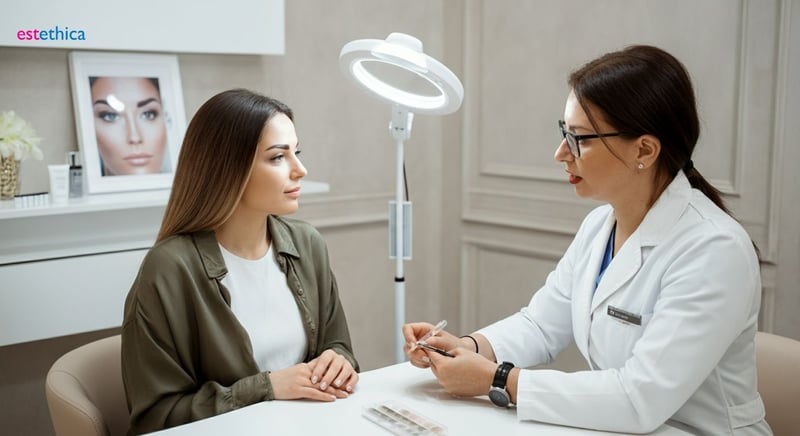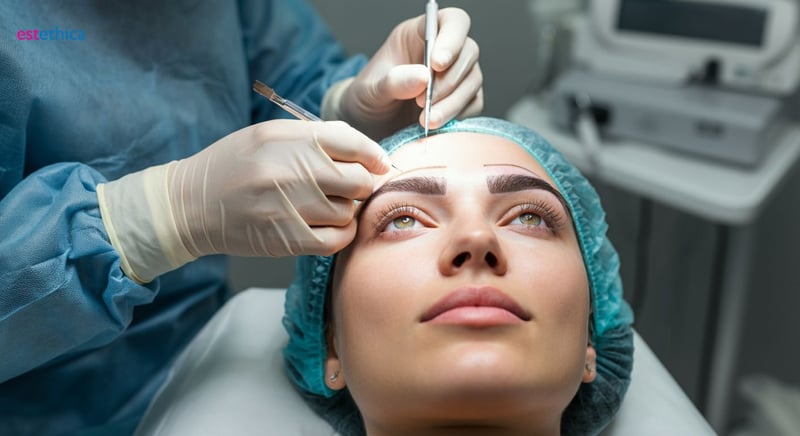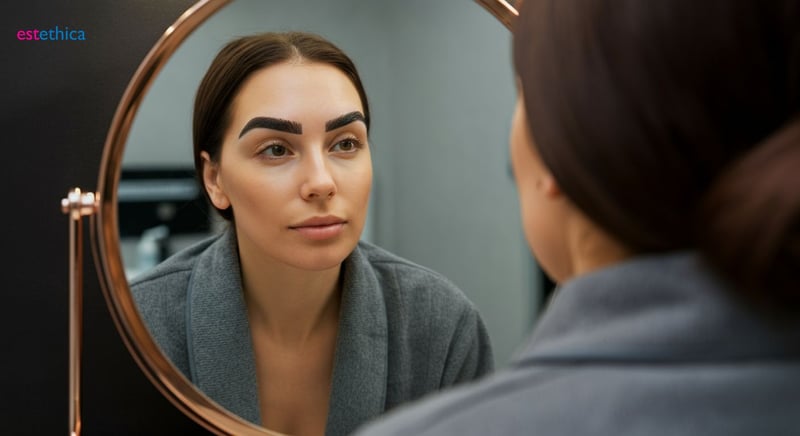Eyebrow Restoration: The Ultimate Transformation Guide
Unlock the secret to natural, fuller eyebrows with our comprehensive restoration guide.
Eyebrow restoration is more than just a cosmetic procedure; it's a life-changing transformation that caters to many individuals seeking fuller, natural-looking eyebrows. As beauty standards evolve, having well-defined eyebrows has become a symbol of youth, confidence, and style. Whether due to over-plucking, genetic factors, or medical conditions, thin or uneven eyebrows can be effectively transformed with modern eyebrow transplant techniques. This guide explores various aspects of eyebrow restoration, ensuring that you are well-informed before embarking on this transformative journey.
Understanding Eyebrow Transplant Techniques: FUE and More
Precision and Natural Results with FUE Eyebrow Transplants
Eyebrow transplants excel due to the Follicular Unit Extraction (FUE) method, celebrated for its meticulous approach and natural-looking outcomes. In this technique, individual hair follicles are carefully taken from a donor area, usually the back of the scalp, and then precisely implanted into the eyebrow region. A key advantage of FUE is its minimally invasive nature, which means no large scars and a quicker recovery for the patient. This allows for detailed shaping and placement of each follicle, contributing to eyebrows that perfectly match the patient's features. Eyebrow restoration through FUE ensures that the implanted hairs blend seamlessly with existing eyebrow hairs, enhancing overall facial harmony.
Advantages of the FUE Technique:
- Minimal Scarring: The FUE method leaves tiny, almost invisible scars, making it challenging to detect that a procedure was performed.
- Natural Look: Because individual follicles are placed with precision, the results mimic the natural growth pattern of eyebrows which also helps to achieve natural looking eyebrows .
- Quick Recovery: Patients usually experience a relatively swift recovery period, allowing them to return to their normal routines shortly after the procedure.
Understanding Factors Influencing Eyebrow Transplant Technique Selection
Choosing the right eyebrow transplant technique depends on various factors. The extent of hair loss, the patient's skin type, and desired eyebrow shape are crucial considerations. For instance, someone seeking a subtle enhancement might benefit most from the precision of FUE, while those needing extensive restoration might consider other methods. The surgeon’s expertise and the clinic’s technology also play significant roles in determining the success of the transplant. It's also imperative to consider potential recovery times and lifestyle adjustments post-transplant. The goal is to select a technique that aligns with the patient’s specific needs, offering optimal results and satisfaction. Approximately, 90% of patients who undergo FUE eyebrow transplants report satisfaction with the natural look of their new eyebrows, underscoring the effectiveness of personalized treatment plans.
Key Steps in Eyebrow Transplant Planning:
- Initial Consultation: The surgeon evaluates the patient's hair loss and discusses desired eyebrow shape and density.
- Donor Hair Selection: Identifying the best source area on the scalp or body that matches the eyebrow hair characteristics.
- Graft Placement Strategy: Planning the angle and direction of each graft to mimic natural eyebrow hair growth.

Is Eyebrow Transplantation Permanent? Longevity and Results
The expected lifespan of transplantation
Eyebrow transplants are generally considered a permanent solution for restoring or enhancing eyebrows. The transplanted hairs, once fully integrated, behave like natural eyebrow hairs, growing and responding to the body’s normal cycles. However, individual results can vary based on factors such as the patient's overall health, the surgeon's skill, and adherence to post-operative care instructions. Maintaining realistic expectations and understanding the nuances of hair growth cycles are important for satisfaction with the procedure. The expertise offered by clinics such as estethica can significantly enhance the success rate, ensuring the transplanted follicles adapt well and continue to produce hair over the long term.
Factors Affecting the Longevity of Eyebrow Transplants:
- Hair Follicle Health: The health and quality of the donor hair follicles play a crucial role in the transplant's success.
- Surgical Technique: Using advanced methods like FUE can minimize trauma to the follicles, improving their survival rate.
- Post-operative Care: Following all aftercare instructions is essential for proper healing and follicle establishment.
Understanding the Hair Growth Cycle Post-Transplant
After an eyebrow transplant, the transplanted hairs go through a typical hair growth cycle, which includes a shedding phase before new growth begins. This shedding is a normal part of the process and not a sign of failure. New hair growth usually starts within a few months, and full results can be seen in about a year. The newly grown hairs should then continue to grow naturally. Regular trimming will then be necessary to maintain the desired eyebrow shape and length. Continued care and occasional check-ups with the transplant team can help ensure the longevity and health of the transplanted eyebrows. Expert advice and care, like that available at estethica, can make a significant difference in optimizing the long-term results of the transplant. In general, a well-executed eyebrow transplant offers a lasting solution for those seeking to improve the appearance of their eyebrows.
Key Stages of Post-Transplant Hair Growth:
- Initial Shedding: Transplanted hairs fall out within the first few weeks, making way for new growth.
- New Growth Phase: Noticeable growth begins after 3-4 months, with hairs gradually thickening.
- Mature Results: Full density and natural appearance are typically achieved within 10-12 months.

Eyebrow Shaping After Transplant: Achieving Your Ideal Look
The role of eyebrow shaping in enhancing transplant results
After an eyebrow transplant, the artistry of eyebrow shaping becomes essential for framing the face and accentuating the impact of the transplant. Skilled aestheticians play a crucial role in helping individuals achieve their ideal look by carefully shaping the transplanted eyebrows to complement their unique facial features. The goal is to create a natural, balanced appearance that harmonizes with the patient's overall aesthetic. This often involves regular trimming and precise shaping to maintain the desired form. Professional advice can guide individuals in selecting styles that not only suit their face but also align with current beauty trends. According to aestheticians, personalized eyebrow shaping can enhance satisfaction among eyebrow restoration recipients, as it elevates the aesthetic outcome and boosts confidence. Expert eyebrow shaping ensures the transplants blend flawlessly and enhance facial expressions.
Essential Steps for Maintaining Your New Eyebrow Shape:
- Regular Trimming: Keeps the eyebrows at the desired length and prevents them from looking unruly.
- Professional Shaping: Seek advice from aestheticians to maintain the ideal arch and form.
- Daily Grooming: Use a spoolie brush to keep hairs in place and enhance the overall appearance.
Exploring different styles and techniques for shaping transplanted eyebrows
Experimenting with various styles is vital after an eyebrow hair transplant to find a shape that best accentuates your features. Techniques such as threading, waxing, and microblading can further refine the eyebrow's appearance. For instance, threading provides precision and is ideal for sensitive skin, while waxing can remove more hair at once, which can be suitable for those with thicker eyebrow hair. Microblading, on the other hand, enhances the density and color of the eyebrows, which is beneficial if the transplanted eyebrows are still sparse. For eyebrow hair transplant surgery, it's essential to consult with qualified professionals like those at estethica, who can offer guidance tailored to the specific characteristics of transplanted hair. It's worth noting that personalized shaping helps achieve natural looking eyebrow restoration, that not only enhances the overall aesthetic but also boosts self-esteem. In fact, individuals often report a significant increase in confidence after achieving their desired eyebrow shape, which indicates its importance in the post-transplant journey.
Consider these tips to enhance your eyebrow shaping:
- Consider Your Face Shape: Different eyebrow shapes complement various face shapes; consult with a professional to determine the perfect match.
- Use High-Quality Tools: Invest in tweezers, scissors, and brushes designed for eyebrow grooming to ensure precision and safety.
- Avoid Over-Plucking: Be cautious not to remove too much hair, as it can lead to sparse or uneven eyebrows.

Eyebrow Transplant Recovery: What to Expect Day by Day
Navigating the Initial Days Post- Eyebrow Restoration
The initial days following an eyebrow transplant are crucial for ensuring the success of the procedure. Patients typically experience some swelling and redness around the treated area, which is a normal part of the healing process. To minimize discomfort and promote healing, it's essential to avoid touching or scratching the eyebrows. Gentle cleaning as advised by the surgeon is important and avoid strenuous exercise that could increase blood flow to the area. Applying cold compresses can help reduce swelling and alleviate any discomfort. Most importantly, adhering to all post-operative care instructions provided by your transplant team, like those at estethica, who are crucial for a smooth recovery. Careful management during these early stages sets the foundation for optimal hair growth and a natural-looking result. Remember, proper care not only aids in recovery but also influences the longevity of the eyebrow hair transplant.
Key steps for a successful initial recovery:
- Gentle Cleaning: Carefully clean the transplanted area as directed by your surgeon to prevent infection.
- Avoid Strenuous Activity: Refrain from activities that can cause sweating or increase blood flow to the face.
- Cold Compresses: Apply cold compresses to reduce swelling and ease discomfort.
Long-Term Care Strategies for Optimal Eyebrow Growth
Sustaining the results of your eyebrow transplant requires a commitment to long-term care, this includes protecting the transplanted area from direct sun exposure, which can damage the new hair follicles. Regular moisturizing helps keep the skin supple and supports healthy hair growth. It’s also advisable to avoid harsh chemical treatments or excessive plucking that could harm the transplanted hairs. Consistent follow-up appointments with your surgeon are essential for monitoring progress and addressing any concerns. A balanced diet rich in vitamins and minerals further contributes to hair health, ensuring that the transplanted eyebrows remain thick and well-nourished. Embracing these practices as part of your routine will help maintain the aesthetic appeal and density of your eyebrow transplant for men and women, for years to come. Remember, long-term care enhances the natural look that results from a well-executed transplant.
Recommended Practices for Sustained Eyebrow Health:
- Sun Protection: Shield your eyebrows from the sun with hats or sunscreen to prevent follicle damage.
- Hydration and Diet: Maintain a balanced diet and stay hydrated to promote strong, healthy hair growth.
- Regular Check-ups: Attend follow-up appointments to ensure optimal healing and growth.
FUE Eyebrow Transplants: Precision Follicle Placement for Natural-Looking Arches
Comprehensive Eyebrow Transplant Recovery Support Ensures Lasting Results
Frequently Asked Questions
What is an eyebrow transplant and who is it suitable for?
How does the FUE eyebrow transplant technique work?
How long do eyebrow transplant results last?
What is the recovery process like after an eyebrow transplant?
Why is eyebrow shaping important after an eyebrow transplant?
Achieve your aesthetic goals with estethica's expert team and advanced techniques.
📞 Get Your Free Consultation!